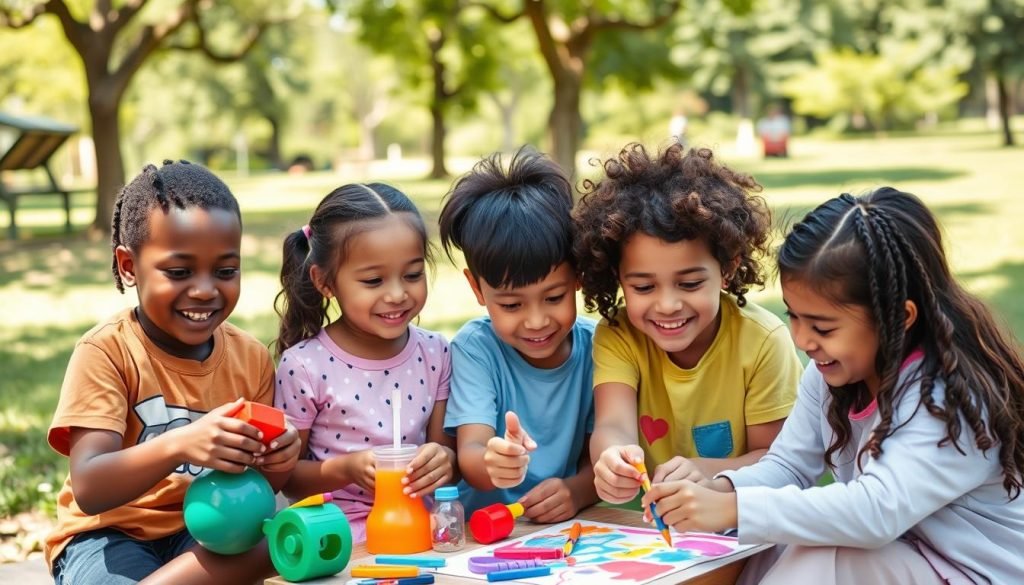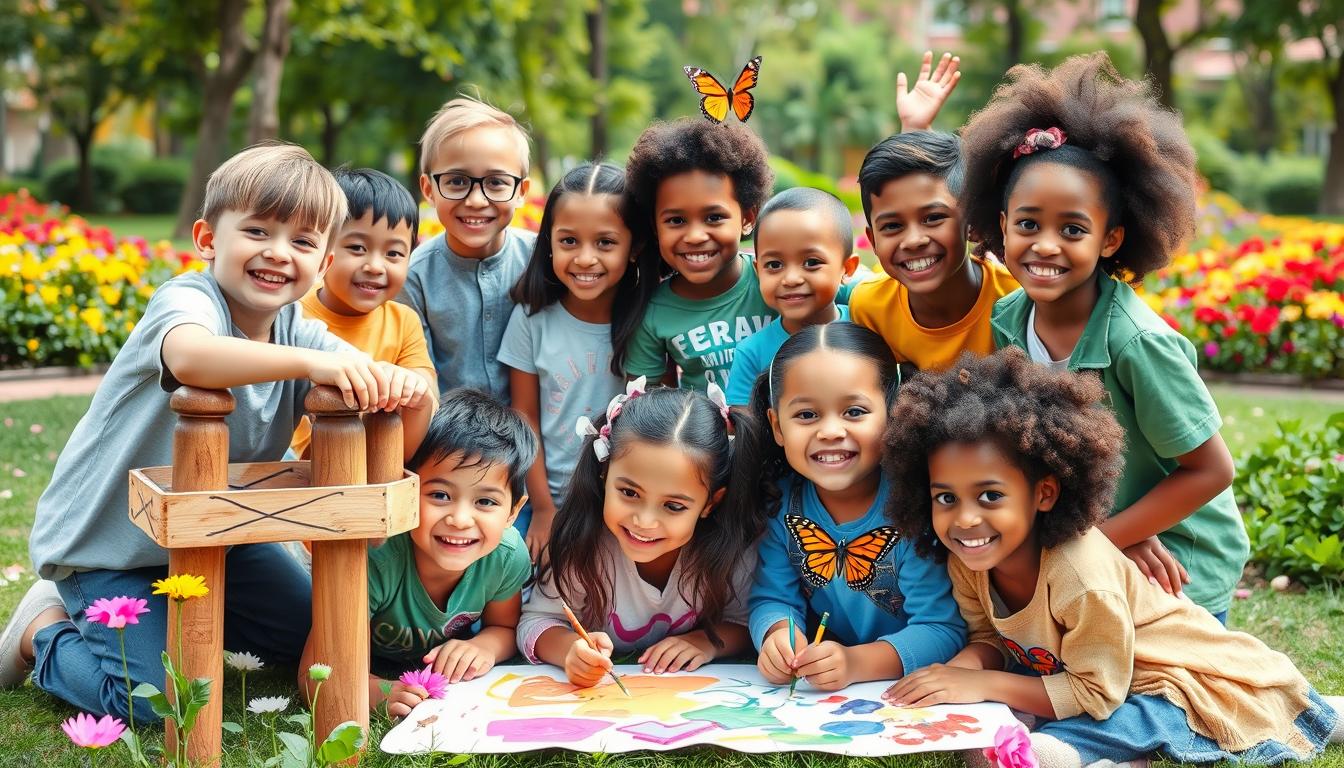As parents, we’ve struggled to find the right balance. We all want to boost our kids’ self-esteem without overdoing it. It’s a tricky path in positive parenting. Did you know 79% of parents think building self-esteem at home is key for kids’ growth? This fact really hits home for most of us. We’ve seen how a strong self-esteem can make a big difference in my child’s life.
We all want our kids to be confident and strong. But, we also know they need to feel capable and self-reliant. This is a big challenge for every parent.
This article will show you ten ways to help your child feel confident without too much praise. We’ll look at methods that boost self-esteem and emotional intelligence. These strategies are backed by research and expert advice, helping our kids face life’s challenges with courage.
Let’s start this journey together. We’ll learn how to build a strong self-esteem in our kids. This will help them grow into confident, capable adults ready to take on the world.
Understanding the Balance Between Confidence and Ego
Experts in child psychology say it’s key to build healthy self-esteem in kids. Parents are vital in this, using warmth and real praise. It’s not about always praising a child to make them feel better than others. It’s about making them see they’re on the same level as everyone else.
By age 5, kids are very honest. This can be good and bad. It shows they’re confident, but it can also cause social problems. Parents can help their kids learn to be honest and kind at the same time. Preventing narcissism starts with parents. Giving honest praise helps build real confidence. It’s not about saying they’re the best at everything. It’s about celebrating their special qualities and hard work. This helps them feel safe and strong.
How we see ourselves is shaped by how others see us. Feeling unworthy can make us doubt our worth. Building confidence is important, but it must be done carefully. Too much focus on ego can make someone too self-absorbed.
- Celebrate children for who they are
- Provide a supportive home environment
- Coach children through social growth
- Encourage belief in oneself and authenticity
The aim is to help a child feel good about themselves without making their ego too big. This balance helps them deal with life’s challenges with real strength and confidence.
Ways to Build a Child’s Self-Esteem Through Meaningful Recognition
Building a child’s self-esteem is important from the start. By age five, their self-esteem is as strong as an adult’s. This is why giving meaningful recognition is key to boosting their confidence. Specific praise is essential. Instead of just saying “good job,” point out what they did well. For example, “You worked hard on that puzzle!” shows you value their effort. This helps them see the worth in their hard work.
It’s also important to acknowledge progress. Celebrate small victories and improvements. This shows them that growth is a journey, not just a destination. It’s especially helpful when they face challenges, as it builds their resilience.
Don’t overlook the value of social skills appreciation. Recognizing kindness, empathy, or teamwork boosts emotional intelligence. A simple “I noticed how you helped your friend” can encourage positive behavior.
| Recognition Type | Example | Benefit |
|---|---|---|
| Specific Praise | “Your drawing has so much detail!” | Encourages attention to quality |
| Effort Recognition | “You didn’t give up on that math problem!” | Promotes perseverance |
| Progress Acknowledgment | “Your reading has improved so much!” | Builds confidence in learning |
| Social Skills Appreciation | “You were a great listener today.” | Enhances interpersonal skills |
Remember, genuine recognition is better than just praising too much. By focusing on effort, progress, and character, we help children develop a strong self-esteem. This will benefit them throughout their lives.
Empowering Children Through Age-Appropriate Responsibilities
Giving kids household chores boosts their self-esteem. When they help out, they learn important skills. They feel like they belong and are capable. Studies show that age-appropriate chores help kids become self-reliant. Toddlers can start with simple tasks like putting toys away. As they get older, they can do more, like setting the table or helping with laundry.
Here’s a list of age-appropriate chores that promote competence building:
- Ages 2-3: Pick up toys, help make the bed
- Ages 4-5: Set the table, water plants
- Ages 6-7: Sort laundry, feed pets
- Ages 8-9: Load dishwasher, vacuum floors
- Ages 10-11: Prepare simple meals, do laundry
Assigning these tasks helps kids develop problem-solving skills. It also gives them a sense of accomplishment. Praise their efforts to encourage them to keep growing and feeling good about themselves.
The Power of Letting Children Make Choices
Giving kids the freedom to choose is a great way to help them grow. It builds their decision-making skills and lets them feel more in control. Studies say about 85% of decisions are still new to kids. By giving them choices, we help them see how their actions affect things.
Start with simple choices. Let little kids pick between two things, like red or blue shoes. As they get older, give them more choices, like helping with daily tasks. This helps them feel more confident and in charge.
Parents and caregivers are very important in this process. Show your child how to weigh the good and bad of choices. Involve them in family talks to teach them about how choices impact others. This helps them understand the big picture and feel empathy.
| Age Group | Decision-Making Opportunities | Skills Developed |
|---|---|---|
| Toddlers | Choosing clothes or books | Basic autonomy |
| School-age | Planning birthday celebrations | Self-confidence, thoughtfulness |
| Teens | Negotiating bigger decisions | Analytical thinking, decisiveness |
It’s okay if kids make mistakes sometimes. These mistakes are chances for them to learn. By supporting them, you help them grow and build confidence for life.
Building Resilience Through Healthy Risk-Taking
Kids need chances to try new things, even if they might fail. This helps them grow strong and confident. Dr. Lauren Henry, a child expert, says resilience is how we deal with tough stuff. She believes kids get stronger by doing things, believing in themselves, and having people who care.
When kids avoid hard things, we can help them face fears step by step. Small wins build belief in their skills. The 5:1 rule says give five good moments for every hard one. This makes kids feel they can handle problems.
Friends and family support is key for bouncing back from tough times. Kids with caring people around them do better with school stress or mean kids. We can help them make friends by finding fun group activities.
Letting kids solve problems builds a growth mindset. They learn from mistakes instead of giving up. This beats helicopter parenting where grownups fix everything. Good problem-solving skills help kids face life’s ups and downs with confidence.
Here are some ways to build strong kids:
- Keep daily routines for comfort
- Teach self-care like eating well and sleeping enough
- Set small, doable goals
- Help kids see the good in themselves
- Show how to stay hopeful in hard times
- Make home feel safe and talk honestly about worries
With these tools, kids grow braver and ready to take on life’s challenges.
Developing Social Skills and Emotional Intelligence
Building strong social skills and emotional intelligence is key to a child’s growth. These abilities help kids form lasting friendships, boost their confidence, and improve self-esteem. Let’s explore how to nurture these essential life skills in children.
Self-awareness is the foundation of emotional intelligence. Encourage kids to reflect on their thoughts and feelings. This practice helps them understand themselves better and builds a positive self-image. As they grow more self-aware, children can better manage their emotions and interactions with others.

Empathy is crucial for relationship building. Teach children to put themselves in others’ shoes. This skill helps them connect with peers and adults on a deeper level. Role-playing different scenarios can be an effective way to practice empathy and perspective-taking.
Effective communication is vital for social success. Help kids express their thoughts clearly and listen actively to others. These skills lay the groundwork for strong relationships and smooth conflict resolution in the future.
| Skill | Importance | How to Develop |
|---|---|---|
| Self-awareness | Foundation of emotional intelligence | Encourage self-reflection |
| Empathy | Key for relationship building | Practice perspective-taking |
| Communication | Essential for social success | Teach active listening and clear expression |
| Conflict resolution | Maintains positive relationships | Provide problem-solving strategies |
Remember, developing these skills is an ongoing process. Praise children’s efforts in social situations and offer gentle guidance when needed. With patience and practice, kids can become socially savvy and emotionally intelligent individuals.
Conclusion
Building a child’s self-esteem is a delicate task. It’s about nurturing confidence without making their ego too big. By teaching mind management and mental resilience, we prepare them for life’s ups and downs. We should create a supportive space where kids feel valued and capable.
Children learn a lot by watching us. By showing them how to be resilient and have self-respect, we teach them important lessons. Giving genuine praise, setting realistic goals, and encouraging responsibility are key. It’s about teaching them to see failures as chances to learn and grow.
Raising confident kids is a complex journey. Sometimes, we need professional help. Kids Miracle Steps services provide support for kids with special needs. With our love and their help, we can raise children who are confident, emotionally smart, and socially skilled.






